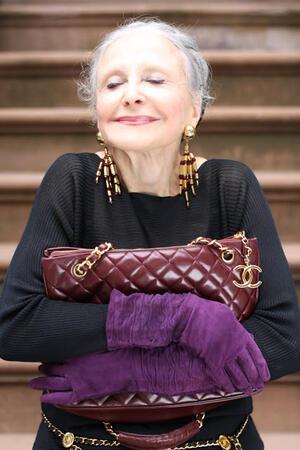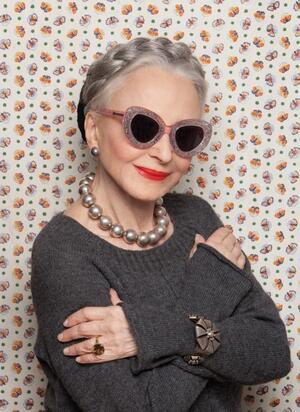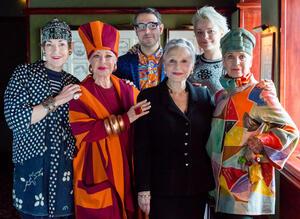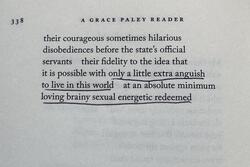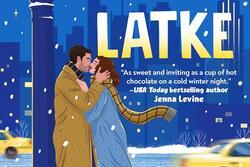Advanced Style: An Interview with Joyce Carpati
On his hugely popular fashion blog Advanced Style, photographer Ari Seth Cohen has introduced readers to some of the world’s most fashionable, fabulous, inspiring women, including Iris Apfel and Linda Rodin. The blog, which features stylish women over 50, has been so successful since it’s founding in 2008 that it has since produced a book and now a documentary film of the same name. Fans come to Advanced Style for the fashion and the flamboyance, but the blog’s commentary on society’s fixation on youth and beauty has been just as influential: even Vogue Italia called Advanced Style less a street-style blog than "a sociological treatise" on ageing and identity. For those readers of Advanced Style who long to know more about the subjects of Mr. Cohen’s photos, the new film is an absolute joy. It delves into the lives and backstories of seven of the blog’s most beloved subjects, including Joyce Carpati, who at 82 must be the world’s most elegant woman.
In addition to her most recent incarnation as a street-style star, Joyce Carpati has been many things: opera singer, advertising and marketing director at Hearst, wife, mother. She has enjoyed so much success and recognition in the wake of her Advanced Style appearances that she’s booked campaigns for Karen Walker sunglasses, appeared on the Today Show, and been photographed for Dazed, Another Magazine, and the Guardian, among many other publications.
I spoke to the lovely Joyce Carpati about style, destiny, and having it all.
Hi Joyce! I want to start by asking you what it is about Advanced Style that people have responded to so strongly.
I think it’s the fact that we women are well advanced in our ages, and we’re enjoying our lives, we’re doing things, and age doesn’t mean a thing! I think this is something new to everybody, and it’s just wonderful.
How did you meet Ari Seth Cohen for the first time?
You know, I always say there’s a destiny, and meeting Ari Cohen was my destiny. I had just returned from Europe, I was living abroad for a time and I came back to New York because of my family. I was walking down Fifth Avenue—I had just come out of one of the stores—and this young man came over to me and he was awfully good looking, and he said “Miss, can I photograph you?” And I thought, what do you mean photograph me? I said to him, “Listen, I’m no cougar!” But we started to talk, and he said he wanted to photograph me for his book that he was putting together of older women who were very fashionable and loved life. So he took some photos on the street, and after that it just kept going and going. This young man gave me another dimension to my life—I really mean that.
You have this level of fame now; do people recognize you on the street?
Yes, they do! As a matter of fact I was on the bus yesterday going to Lincoln Center; there were four women sitting there who had seen me in the movie and were so excited to see me. It happens quite often. I go to pool at the Y quite often, and after I was on, the whole staff said “Oh! We saw you on TV!” The people who approach me and congratulate me are just so excited to see women my age doing work like this. It’s almost like they can’t believe it—and neither can I sometimes.
You speak in the film about working for Good Housekeeping and Cosmopolitan. Can you tell me more about your career at Hearst?
I started to work for Hearst in 1972. I had moved back to New York from Rome, Italy, where I had lived with my husband and son for a number of years. I started to work for the Hearst Corporation as an assistant to the advertising director, not because I had to work, but because I wanted something to do. I thought, let me just try this. And, like meeting Ari, that was my destiny! I thought I’d stay at Hearst a little while and have something to pass the time. There were no women in the advertising department, none at all. You found them in editorial, but not in advertising.
Men would go out presenting the magazines, and going after millions of dollars of business. So I spoke to the ad director and told him I would love to represent the magazine, and after being turned down and told that advertising wasn’t a woman’s job again and again, I just kept bothering him and one day he gave me a chance. I was the first woman to sell for the Hearst Corporation, and from there I became the first woman manager at Good Housekeeping. After that I went over to Cosmopolitan as marketing director for beauty and fashion. I worked very closely with Helen Gurley Brown, and we became very good friends. She was a woman I really admired.
What it was like to work in the magazine industry as a woman in the 1970s?
Working in a male-dominated industry can be difficult if you let it be. I got along very well with the men, and they were always very surprised at my great success. A woman selling a women’s magazine is very different than if men go out and do it. After me, everyone started to hire women! I was very good at my job, and I have such wonderful memories from those days. I traveled, I had all of the best accounts, I knew everyone. Once I got Sophia Loren to come to a Hearst party at Tavern on the Green, and needless to say all of the biggest companies wanted to come as our guests!
Incredible! And that wasn’t even your first career…
My first love was music. I’d studied opera—I’ve had nine lives, really! I was born in Brooklyn to wonderful parents who had come here from Russia. I absolutely adored them. My mother started me on singing lessons at a very young age. When I was 16, Olin Downes chose me as the most outstanding teenage talent in America. I still have letter from April 5, 1949 written to me by Mr. Downes, the music critic at the New York Times. I also still have a tape of myself singing the Queen of the Night’s aria from The Magic Flute! After I retired from Hearst, I went to Europe and gave concerts. I never really left opera behind.
One of the most touching scenes in the film is when you’re talking to your granddaughter. Can you speak about your relationship with her?
She’s a wonderful girl who’s doing extremely well in school. My son and his wife are both critical care specialists, and they have a very close-knit family. We live within walking distance of each other and we see them very often. I always say that it’s so important to keep your family and friends close to you, because they’re a comfort as you get older.
Young women today talk a great deal about “having it all.” You’ve had such a full life, and managed to have a family and a thriving career. Do you feel like you’ve had it all?
I think, if you ask me, I have. You have to know what to do with your life. First of all, if you have a family, you have to make them happy. If you make them happy, you make yourself happy. You can have your career, but you have to put everything in perspective. I did, I had everything. My husband was always very proud of me, and so was my son.
If you could tell your 20-year-old self anything, what would it be?
I would tell myself to concentrate on what you want to do and stick with it. Pursue it, and it will come. And this I say to anyone at any age: Don’t worry if something goes wrong, because it always gets better. You have to believe it, and it does, you cannot fret, because tomorrow is another day.
Advanced Style the film is now available on iTunes. Find it at your local theater at advancedstylethemovie.com!

